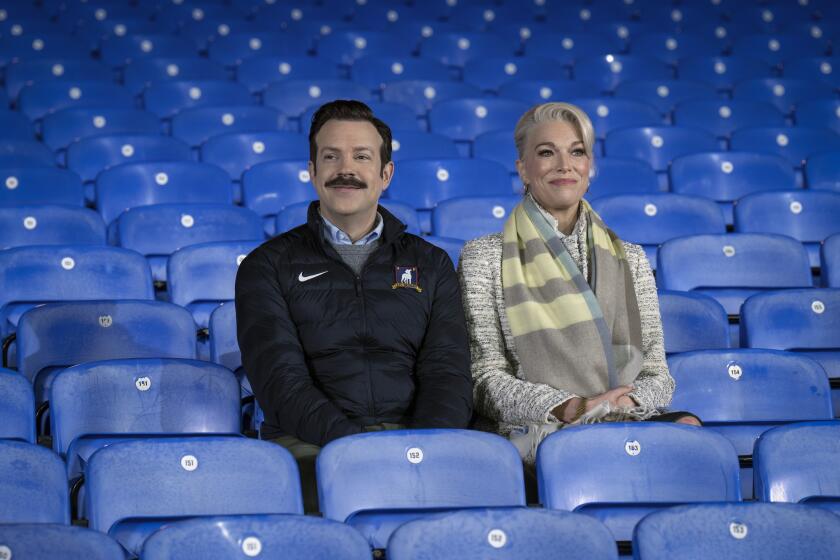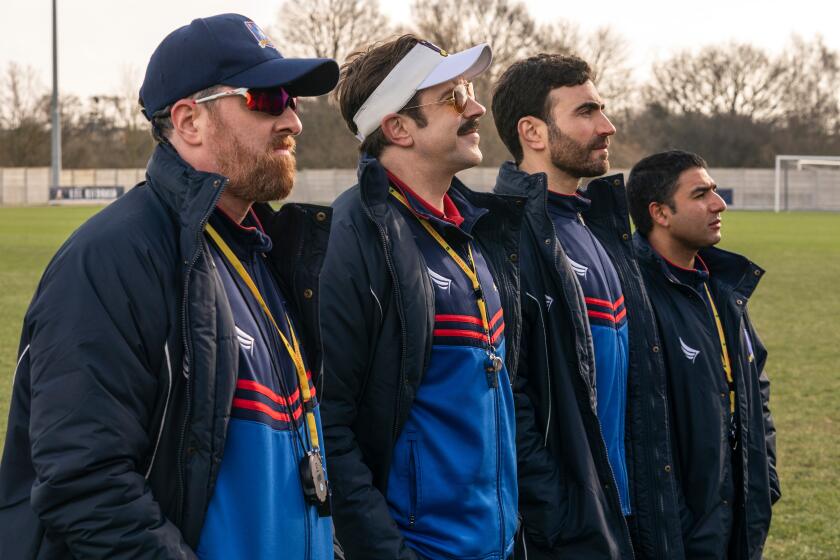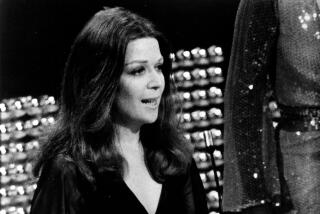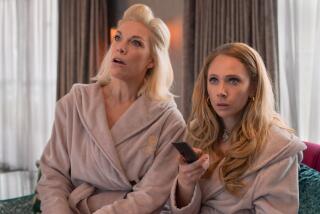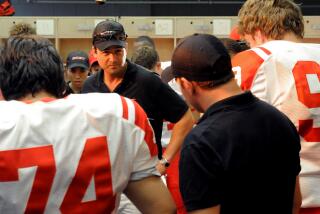Is this the end of ‘Ted Lasso’? If it was, it didn’t disappoint
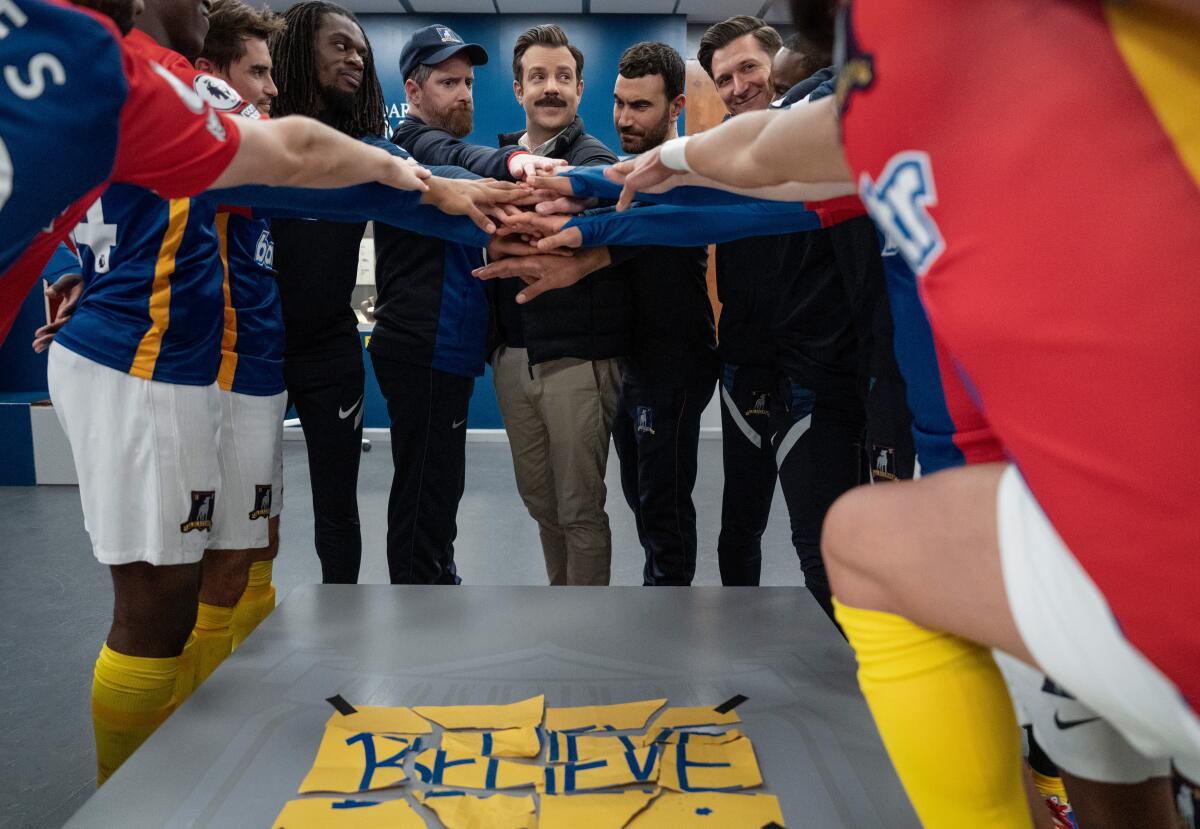
This piece contains spoilers for the Season 3 finale of “Ted Lasso.”
Two popular series came to a conclusion this week. One was populated exclusively by horrible people, the other almost entirely by good ones. Both raised the question of whether change is possible; the first seemed to say no, the second explicitly, emphatically declared yes. I had little interest in the former and remained a fan of the latter through its life, which may say more about me than either of the shows in question, and so be it.
“Ted Lasso,” which appears to have concluded its three-season run on Apple TV+ on Wednesday, is that second show, which went out with tears, hugs and a chorus of “So Long, Farewell” from “The Sound of Music.” There were no big surprises. Anyone paying attention, and sensitive to the show’s heart, would know that Ted (Jason Sudeikis) would go back to his son and America at the end; that Nate (Nick Mohammed), who had defected briefly to the dark side, would make his way back to the light; and that the Richmond Greyhounds would not lose their final match. If you remembered the “Sunflowers” episode, in which the team visits Amsterdam, you might have predicted that Rebecca (Hannah Waddingham) would meet her one-night stand again, fulfilling a psychic’s prophecy, and the show’s duty to the character — because it was the sort of show that would not let her, or any of its characters, down.
The actor who plays Rebecca Welton on Apple TV+’s hit show discusses the Season 3 finale and whether this is really the end of the series.
This didn’t strike me as a failing. Unpredictability isn’t always to the good, especially when you’re wrapping up a series in which fans are emotionally invested. It was sentimental as heck, and possibly unrealistic, and at times extremely obvious — all text, no subtext. You don’t have to look far to find viewers proclaiming the demerits of the current season — people who, by definition, have cared enough about the show to be disappointed and who give considered reasons why this season was not as good as the last (which also happened in the second season). Writers I respect have come down hard on it. And you can’t argue with another person’s experience. But I loved it.
The series presented the story of an American college football coach who knows nothing about soccer — that is, football, as defined everywhere but here — and is hired to manage a low-ranked English team in order (though he doesn’t know this) to sink it. (Quite the opposite happens, obviously.) That’s the premise. But what “Ted Lasso” was “about” is something else. For one thing, title aside, it wasn’t about Ted Lasso, in the end just one character of a connected many. (He corrects journalist Trent Crimm, played by James Lance, who has titled his book on the team’s season “The Lasso Way”: “It’s not about me — it never was.”)
What the show was about is becoming a better person, the radical nature of kindness, and the importance of family, in whatever shape it comes — a football team, its fans, the ad hoc men’s group the Diamond Dogs, and actual relations. (We got the late-season treat of Becky Ann Baker as Ted’s visiting mother.) In a last-episode complication, Rebecca considers selling the club; finally, she sells 49% of it to the fans, enlarging the family. “Heaven is other people” might be its animating idea.
Meet the cast, go behind the scenes on key episodes and read our analysis of the inspirational sports comedy that TV fans can’t stop talking about.
“Ted Lasso” was long on talk and interested in the sort of delicate feelings not always associated with sports stories and, perhaps, never aired in an actual locker room. It didn’t shy from wearing its heart on its sleeve and pointing it out with the other hand. But obviousness, if not the most sophisticated approach to storytelling, is appreciated when it amplifies one’s own feelings.
Realism wasn’t the point; certainly it was an inexact portrayal of the workings of a football team, off and on the pitch. No actual person spins elaborate, obscure pop-cultural puns and similes off the top of their head like Ted did (“I’m like Michael Flatley at 11:59 p.m. on St. Patrick’s Day — I’m tapped out”), perhaps a little too often. Things happened in Richmond’s final game that made no sense strategically, only emotionally. No problem. Emotions are what we came for. Winning is just a bonus.
The show was a kind of fairy tale, and fairy tales reward the good and punish the bad. As far as villains, apart from Sam Richardson’s brief return as spiteful Ghanaian billionaire Edwin Akufo, there was only Anthony Head’s narcissistic Rupert, Rebecca’s ex and owner of a rival team; significantly, his comeuppance came not at the hands of any other character — that would have required an ordinarily kind person to be cruel — but by his own doing. Everyone we care about in the show grows up a little, gets out of their own way, repairs a relationship, or just learns to be happier in their skin.
There are some who rate series not only from season to season but episode to episode, as a sports fan might blow hot and cold on a team from play to play. It’s as legitimate a way to watch television as any other, if you have that kind of energy. But it isn’t the way I watch, just as I don’t judge a book from chapter to chapter. That isn’t to say a show can’t go off the rails or run out of ideas, but as a viewer — and as a critic, if a full season is provided for review — I tend to wait until all comes to a conclusion to … come to a conclusion. And “Ted Lasso” didn’t disappoint me in the end.
‘Ted Lasso’
Where: Apple TV+
When: Any time
Rating: TV-MA (may be unsuitable for children under the age of 17)
More to Read
The complete guide to home viewing
Get Screen Gab for everything about the TV shows and streaming movies everyone’s talking about.
You may occasionally receive promotional content from the Los Angeles Times.
